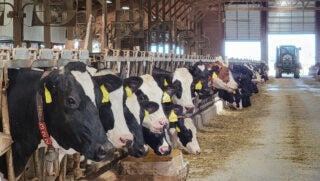FFA programs are a staple in rural high schools across America, where agriculture is at the center of the local economy and lifestyle. But as America becomes more urban than ever before, FFA is starting to reach into the city to bring a little bit of green into the concrete jungle.
After growing up in rural Florida and student teaching in Oconee County, Georgia, agriculture teacher and FFA advisor Emily Courson never imagined she would teach in an urban area. However, as the country recovered from the COVID-19 pandemic of 2020, Courson saw a desperate need for an agriculture program at W.R. Coile Middle School in the city of Athens, Georgia. When Courson arrived in the fall of 2020, the agricultural program was non-existent.
“There was no FFA, there was no money, there wasn’t a program. I had to start over from square one,” she said.
As students gradually came back to school, Courson worked hard to make agriculture a fun class where students got to work with their hands and interact with plants and animals after learning online for so long.
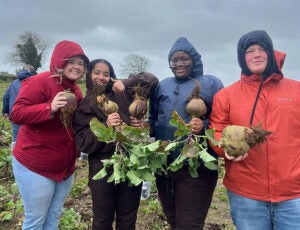
Courson quickly learned that the traditional agricultural education she grew up with needed to be adapted for the urban lifestyles her students led. As a student teacher, plant sales had been a major part of program fundraising, but many families in Athens and surrounding Clarke County simply didn’t have the money or time to spare for house plants and landscaping.
According to Athens-Clarke County records, 40 percent of school-aged children in the area live in poverty, facing a variety of difficulties from food scarcity to substandard housing and unsafe neighborhoods. Due to the county’s poverty and instability, Clarke County is a Title I school system, meaning that there are numerous resources available to help ensure that students receive the best education possible.
Thanks to school funds and generous sponsorships from the community, Courson never had to turn away a student who was eager to participate but in need of financial support. She realized within her first few weeks of teaching that “there’s a huge misconception that these kids from Athens don’t have resources or don’t have the passion. A lot of these kids have very bright futures and they’re very passionate about agriculture.”
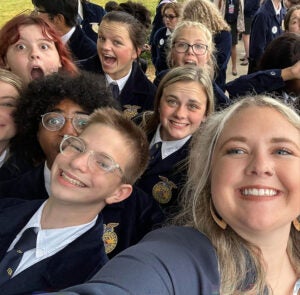
Even with the resources available to the program, Courson realized that she had to re-evaluate what it meant to win events and have a successful FFA program.
“I used to think you had to show up to every competition to win,” she said. “And then when I started working at Coile, I realized part of winning was just taking your own personal wins, like getting kids on a bus to go to a competition — that was a lot for them.”
Agriscience Fair competitions worked especially well with her students, as it was non-traditional and something they could win and take pride in, as well as Career Development Events such as veterinary science, floriculture, and nursery landscape.
According to Courson, the key to her success was relating agriculture to her students’ and their lives outside of school.
“Everyone has some sort of agricultural tie, it was finding out what they could relate to, since none of them had a traditional agriculture background,” she said.
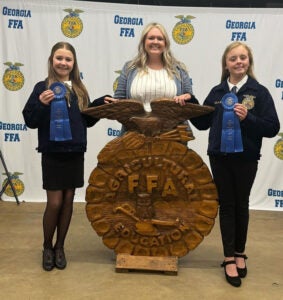
Many of Courson’s students were Hispanics and Latinos, and she learned early on that these students knew a lot about crops and landscaping and excelled in projects focused on plants.
“Bringing in their culture with agriculture gave them a lot of ownership,” Courson said.
By the time Courson left to take a position at Clarke Central High School, Coile Middle School was the fifth-ranked chapter in the region with four state Agriscience winners, a full officer team, and over 100 members. Looking back at her time in Clarke County, Courson has so many sweet memories and relationships, such as her first National FFA Convention & Expo with her students, their first state Agriscience Fair win, and a spring break study abroad to Ireland this past April.
Even though Courson now teaches at Malcom Bridge Middle School in neighboring Oconee County, she’s still very much involved in Clarke County’s FFA program, noting that she “loved working there and it’s something [she would] do all over again.”
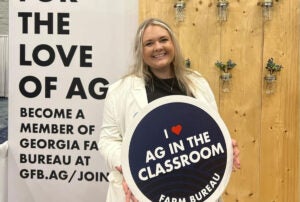
Looking ahead, Courson sees a big need for agriculture education and advocacy in metropolitan areas.
“It’s critical that we bridge the gap between urban and rural,” Courson said. “The world is going to get more urban than rural, and agriculture needs to reach into urban areas more and be better understood by the urban community.”
Courson said sustainable agriculture is especially needed, and young people in these metropolitan areas have the best chances of coming up with sustainable agricultural practices because of their experiences growing up in an inner-city setting.
“People don’t have to be involved in agriculture in an urban setting, but I definitely think it needs to be acknowledged and respected,” she said.
Kate Walker is a student at Georgia College and State University. Originally from Watkinsville, Georgia, she has a passion for writing and all things agriculture.


